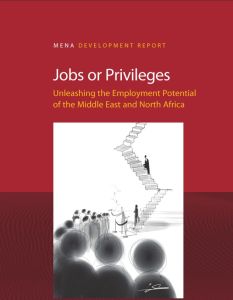Rejoignez getAbstract pour lire le résumé !

Rejoignez getAbstract pour lire le résumé !
Marc Schiffbauer, Abdoulaye Sy, Sahar Hussain, Hania Sahnoun and Philip Keefer
Jobs or Privileges
Unleashing the Employment Potential of the Middle East and North Africa
World Bank, 2014
Aperçu
Corruption and cronyism in the Middle East and North Africa stifle regional economic growth.
Recommendation
Corruption, bureaucracy and the difficulty of conducting commerce in an open and transparent manner make developing new business in the Middle East and North Africa particularly challenging. In this incisive World Bank report, analysts Marc Schiffbauer, Abdoulaye Sy, Sahar Hussain, Hania Sahnoun and Philip Keefer examine why Algeria, Djibouti, Egypt, Iran, Iraq, Jordan, Lebanon, Libya, Morocco, Syria, Tunisia, West Bank and Gaza, and Yemen experience high unemployment, low productivity, opaque policies and pivotal industries heavily tied to powerful politicians. The authors examine the problems that cronyism cause, using new data available in the aftermath of the Arab Spring to quantify the cost of corruption. getAbstract considers their painstaking report important reading for executives, investors, policy makers and leaders of nongovernmental organizations.
Summary
About the Authors
Marc Schiffbauer is a senior economist at the World Bank, where Abdoulaye Sy, Sahar Hussain and consultant Hania Sahnoun are economists. Philip Keefer is a principal adviser at the Inter-American Development Bank.

















Comment on this summary